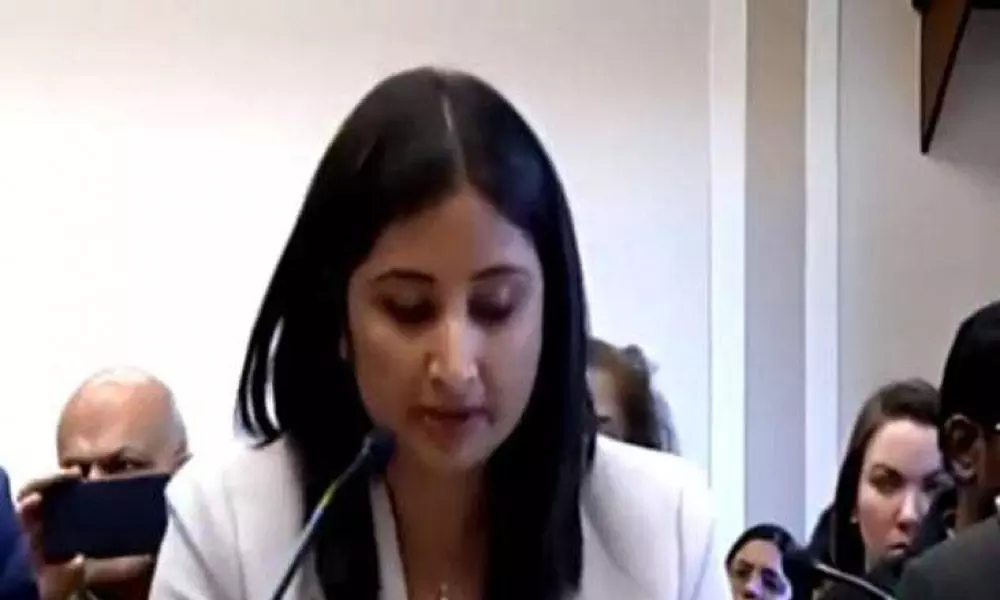Live
- WPL 2025: Matthews, Sciver-Brunt and Harmanpreet carry MI to massive 213/4
- MLA Anirudh Reddy Accuses KTR of Involvement in Manhattan Project Scam
- TGPSC Clarifies on False Propaganda Regarding Group-1 Recruitment
- Hyderabad Police Ensures Security as Holi and Ramadan's Second Friday Coincide
- Five MLCs Elected Unopposed in Telangana Under MLA Quota
- Sambhal prepares for a peaceful Holi with tightened security and special patrols
- CNG, PNG prices to become cheaper in Rajasthan from March 14
- Anti-Rape ad to screen in theaters before movies, like health advisories
- Prodigy Finance Offers Three Scholarship Awards totalling an amount of $19,000 for Global Students Starting Fall 2025
- Champions League drama likely to affect La Liga with big games this weekend
Kashmir witnessed ISIS-level horror before the West was apprised on it: Columnist Sunanda Vashisht

Sheila Jackson Lee, a Representative from Texas, in response to Vashisht asked for a pathway to ensure human rights in the region.
WASHINGTON DC: Kashmir has witnessed a similar level of horror and brutality as inflicted by the Islamic State in Syria, prior to the time when the West and other international communities were apprised about the worst human rights situation in the Valley, claimed Kashmir columnist Sunanda Vashisht.
"We have seen ISIS level of horror and brutality in Kashmir, 30 years before the West was even introduced to the brutalities of radical Islamic terror. I am glad these hearings are happening here today because when my family and everyone like me lost our homes our livelihood and our way of life the world remained silent," Vashisht told a Congressional hearing on Human Rights organised by Tom Lantos HR Commission in Washington on Thursday (local time).
"Where were the advocates of human rights when my rights were taken away?" Vashisht asked the panelists who were present at the hearing.
"Where were they on the night of January 19, 1990, when there were voices blaring from all mosques in Kashmir that they wanted Kashmir with Hindu women but without Hindu men?"
"Where was the saviour of humanity when my feeble old grandfather stood with kitchen knives and an old rusted axe ready to kill my mother and I in order to save us from the much worse fate that awaited us?" she questioned further.
She then said, "My people were given three choices by the terrorists: flee, convert or die on the same fateful night."
Around 400,000 Kashmiri Hindus fled right after the night of horror.
"They survived. Those who didn't were killed. Today, 30 years later, I am still not welcome in my home in Kashmir. I am not allowed to follow my faith there. My house in Kashmir is illegally occupied as most others in my communities. And those which were not occupied have been burnt down or ransacked," she told the hearing.
Meanwhile, Sheila Jackson Lee, a Representative from Texas, in response to Vashisht asked for a pathway to ensure human rights in the region.
"We should try to find a pathway to at least do the basics to ensure human rights in the region. Why not allow the members of the US Congress to visit both parts of the Jammu and Kashmir-- in India as well as Pakistan," Lee said.
Sunanda also said its high time to strengthen India to fight against insurgencies in Kashmir, adding that the move will followingly help in solving the human rights problems in the region forever.
"India's democratic credentials are unmatched. The country has successfully, in a democratic setup, defeated insurgencies in Punjab and northeast. It is time to strengthen India against such insurgencies and the human rights problems will be solved forever," she said.
"We are dealing with Islamic terrorism in Kashmir," Vashisht told the panelists.
"We have to be cognizant of the fact. All deaths have been happening due to terrorists trained by Pakistan. This doublespeak is not helping India in any way," the columnist stressed before the gathering.
She said that the international community has to assist India in eradicating radical Islamist terror that is when the human rights situation will be possible.
"Plebiscite in Kashmir is never going to happen," she said.
A plebiscite requires the entire community to unite for a decision, but in this case, a part of Kashmir is in India, another in Pakistan, a part of it is also held with China, Vashisht added.
In her concluding remarks, the columnist further stated that India has "not occupied" Kashmir and that Kashmir was always an integral part of India.
"India is not just a 70-year-old identity, but a 5000-year-old civilisation. There is no India without Kashmir, and no Kashmir without India," she said.
She also said that equal rights to the LGTBQ communities and property rights to women have only been accomplished through the abrogation of Article 370 in Jammu and Kashmir.
"The Indian Constitution which is modelled on the US Constitution is the most liberal document in the world. The Constitution was not applicable in totality until Article 370 was into force."

© 2025 Hyderabad Media House Limited/The Hans India. All rights reserved. Powered by hocalwire.com






